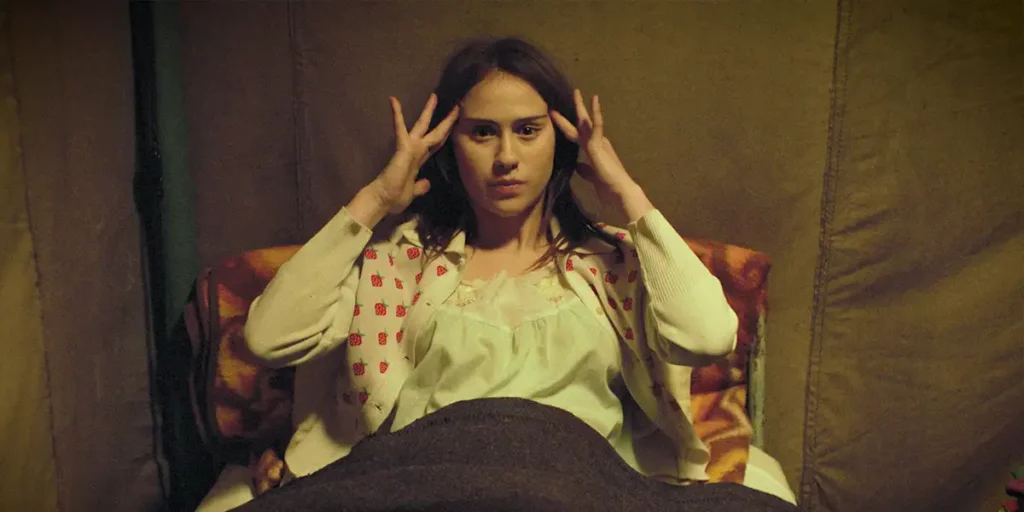Triumph revisits the old Bulgarian alien-hunt mystery of The Tsarichina Hole and constructs a story out of it that doesn’t need much to say a lot.
Directors: Petar Valchanov & Kristina Grozeva
Genre: Drama, Mystery, Comedy
Run Time: 97′
TIFF Screening: September 8, 2024
Some of the pages of the Bulgarian history book, already being as extensive as it is, are filled with unsolved mysteries and inexplicable findings due to the territory’s importance throughout the centuries. Among many, one sensationalist news headline from the 1990s hinted that the first inhabitants of this land might be beyond terrestrial.
Bulgarian directors Kristina Grozeva and Petar Valchanov expand on this loony story and mold it into the satirical feature that is Triumph. The film is Bulgaria’s submission for this year’s Academy Award in the international category.
A Bulgarian task force of high-ranking military officials initiates a classified mission to dig out a mystical artifact, which could alter the course of humanity, or bring more knowledge about our origins, or provide contact with extraterrestrial beings. Honestly, what this artifact could do is not exactly known. The heads of the operation, General Zlatev (Ivan Savov) and Colonel Platnikov (Julian Vergov), are trustingly following the lead of two extrasensory women, the Colonel’s gifted daughter, Slava (Maria Bakalova, of Bodies Bodies Bodies), and the General’s personal psychic, Pirina Nyagolova (Margita Gosheva). The two women act as the “signal conductors,” delivering messages from the beyond and giving directions on how to get to the artifact.
Almost entirely set in one location, the infamous Tsarichina Hole, Triumph gives us a comical but intricate read of what might have gone down in the fields, where the secret military operation took place back in the 90s, freshly after the fall of communism. As the characters get closer to unraveling the secrets of the underground, their own secret motivations and desires rise to the surface. Complex schemes of manipulation clash with each other when night falls over the site and threaten to lead the mission towards a dead end.
The prolonged opening sequence of the film sets the exact tone of offbeat ridiculousness the audience should expect throughout its entire runtime. Slava, who has ended up accompanying her father to the field due to unforeseen circumstances, is recruited by Nyagolova to help on the classified mission and be a vessel for communication with alien creatures. The group of military men follow the orders of the two psychic guides, unwaveringly trusting in their unconventional methods and almighty metaphysical abilities to use otherworldly words such as energetic “reflectorine,” “ordinaire,” “deactiminate,” etc.

The events of the film unfold at the whim of Pirina Nyagolova, who presents herself as the possessor of superior knowledge – a woman in charge of not only her intelligence but also her acute perception of the gender dynamics within her environment. Nyagolova is an intriguing character whose objectives are never clear, but we quickly find out they’re not as pure as presented. She appears to weaponize her femininity against the men in high places during a time in history when womanhood was still the only power that she could leverage to get ahead. We progressively become more aware of how far she’s willing to go to preserve her frail position in the hierarchy, even if it means it’s at the expense of her less experienced psychic partner.
Slava might not be the commanding voice of the operation, but she surely commands the screen when she’s in frame, from the moment we see her ¨calibrating¨ herself on the field (by spinning around in a circle) and learning how to dance as if she’s never had to use her body in that way before. Maria Bakalova is undoubtedly the driving force of Triumph, bringing a fascinating and hilarious peculiarity to her performance as Slava, the innocent free spirit who ends up a victim of an unjust system with way less transparent intentions than hers.
Albeit brief, Slava’s carnal affair with Private Georgi, played by Julian Kostov (Shadow and Bone), serves as the perfect catalyst for disruption. Georgi is an object of exploration for Slava. The scenes they get to share are sparse, but their presence and magnetism on screen together remain the highlight of my viewing of Triumph. With all that being said, Slava and Private Georgi’s dynamic does not abandon the quirky framework Triumph exists in and the parameters of the satire genre. Through their fleeting moments in the film, they foster a young forbidden love (if you could call it that), which is easy to root for but cannot survive against the conservatism still reigning over far more than just the vast greenery of Tsarichina.
Kristina Grozeva and Petar Valchanov manage to create a historical satire with sci-fi-adjacent elements without absolutely any need for special effects. This is evidently a purposeful choice just as much as the minimal soundtrack is, both further emphasizing the oddity of the atmosphere that Triumph drops us in. However, at the end of the day, the film only really lifts off when it stands on the shoulders of the actors. It relies almost exclusively on their performances to drive the message home, and, luckily, they are as committed as they get.
Triumph was screened at TIFF on September 8, 2024. Read our list of films to watch at the 2024 Toronto Film Festival!

